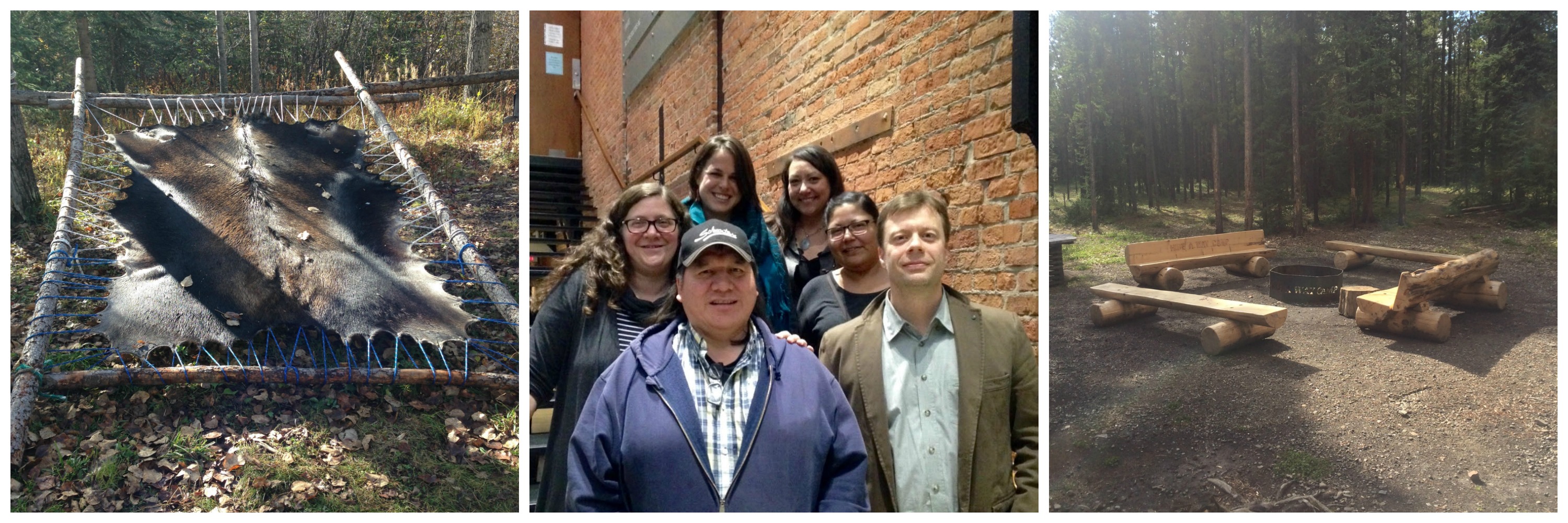
Left : A moose hide ready to be tanned. Centre: Members of the Wahkohtowin Project gather at Triffo Hall on October 28 (Back: Graduate student Renee McBeth and Prof. Shalene Jobin; Middle: Prof. Hadley Friedland and graduate student Tara Kappo; Front: Aseniwuche Winewak community member Ken McDonald and Faculty of Law Associate Dean Matthew Lewans. Right: Fire pit at the Hide A Way Camp near Grande Cache, AB
Learning is not restricted to the classroom. That's the message University of Alberta Faculty of Law Visiting Assistant Professor Hadley Friedland and Faculty of Native Studies Associate Professor and Aboriginal Governance Director Shalene Jobin had in mind when they created "The Wahkohtowin Project: Pedagogy and Practice through Community and Academic Indigenous-Based Learning Collaborations."
The project officially launched on October 28 at an event at Triffo Hall to recognize six groups chosen to receive $50,000 in funding from the Office of the Provost and the Faculty of Graduate Studies' Indigenous Community Engagement, Research and Learning (CERL) fund.
The purpose of the fund is to support opportunities for the University of Alberta to participate in collaborative change with Indigenous communities and peoples, which aligns with the University's mission of research and teaching as set out in the new Institutional Strategic Plan, For the Public Good.
The Wahkohtowin Project, a for-credit, on-the-land, and in-class course, is expected to launch in July 2017 and accommodate up to 12 students. Professors Friedland and Jobin emphasize that students don't have to have an Indigenous background to participate.
"For some, it might be their first time in an Indigenous community," said Professor Jobin.
The course invites students to explore the Cree concept of Wahkohtowin, which translates approximately as our inter-relatedness and interdependence. The concept has been a central tenet of Cree law, governance, philosophy, and spirituality for centuries. More recently, scholars have started to engage with the concept from an academic perspective, unpacking its historical and evolving meanings and applications in Cree law and governance structures.
Professors Friedland and Jobin are the principal investigators of the project. Matthew Lewans, Associate Professor and Associate Dean of Graduate Studies at the Faculty of Law, and graduate students Tara Kappo (Faculty of Native Studies) and Renee McBeth (Department of Political Science) are university-based members of the research team. Adelaide McDonald, Mabel Wanyandie, Ken McDonald, Robert Wanyandie, Vicky Wanyandie, and Alice Moberly are some of the community-based members of the research team.
The course will take place in Aseniwuche Winewak traditional territory near the town of Grande Cache, Alberta. Community members of the Wahkotowin project team are fluent Cree speakers and experts on traditional practices that require specialized skills and have been passed down from generation to generation. In keeping with the spirit of Wahkotowin, building and nurturing meaningful relationships is a priority for all members of the team.
Students must complete an application to register for the course, which is expected to be cross-listed between the faculties of Law, Native Studies, and Graduate Studies. Students who are selected to participate will learn ways to respectfully and productively engage with Cree legal traditions and governance principles like Wahkohtowin. Students will learn through a number of activities, including lectures, storytelling, nature walks, raising a teepee - and the course's central activity: the traditional brain-tanning of a moose hide. Students will take part in three mandatory preparatory classes prior to the camp, and two integration classes following the camp, to provide opportunity for structured reflections on their experiential and land-based learning experiences.
While UAlberta professors will teach some elements of the course, Elders and other experts from the community will play a central role in both planning and teaching other elements of the course. Professor Friedland noted that offering the course is a way for the university to build mutually respectful and mutually enriching relationships between academic and Indigenous communities of learners.
"This course is an amazing opportunity for students to explore a different way of teaching and learning," said Professor Friedland, adding that the team is hopeful that the course - with additional funding - will be offered for many years to come.
In the coming year, university and community-based members of the Wahkohtowin team will take turns hosting and travelling to planning meetings to create the team and the course. The first meeting was hosted in the community of Susa Creek in Aseniwuche Winewak territory. The next meeting will be hosted by the university-based team members in Edmonton on campus, signaling the beginning of what professors Friedland and Jobin hope will be a transformational relationship for both UAlberta and Aseniwuche Winewak collaborators and students.